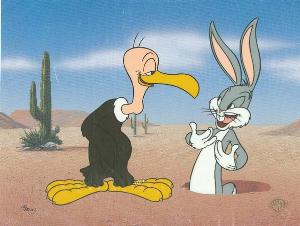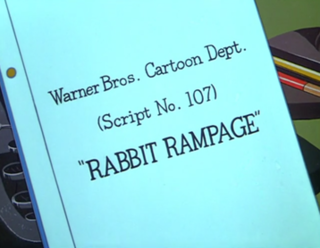
Looney Tunes is an American animated franchise produced and distributed by Warner Bros. It began as a series of short films that originally ran from 1930 to 1969, concurrently with its partner series Merrie Melodies, during the golden age of American animation. Following a revival in the late 1970s, new shorts were released as recently as 2014. The two series introduced a large cast of characters, including Bugs Bunny, Daffy Duck, and Porky Pig. The term Looney Tunes has since been expanded to also refer to the characters themselves.

Merrie Melodies is an American animated comedy short film series distributed by Warner Bros. Pictures. It is the companion series to Looney Tunes, and featured many of the same characters. It originally ran from August 2, 1931, to September 20, 1969, during the golden age of American animation, though it was revived in 1979, with new shorts sporadically released until June 13, 1997. Originally, Merrie Melodies placed emphasis on one-shot color films in comparison to the black-and-white Looney Tunes films. After Bugs Bunny became the breakout character of Merrie Melodies and Looney Tunes transitioned to color production in the early 1940s, the two series gradually lost their distinctions and shorts were assigned to each series randomly.

The Unmentionables is a 1963 Warner Bros. Merrie Melodies cartoon directed by Friz Freleng. The short was released on September 7, 1963, and stars Bugs Bunny.

Bugs Bunny Gets the Boid is a 1942 Merrie Melodies cartoon, directed by Bob Clampett, produced by Leon Schlesinger, and released to theatres by Warner Bros. Pictures. It marks the first appearance of Beaky Buzzard in a Warner Bros. short.

Long-Haired Hare is a 1949 American animated short film directed by Chuck Jones and written by Michael Maltese. It was produced by Warner Bros. Cartoons and distributed by Warner Bros. Pictures as part of the Looney Tunes series, and was the 60th short to feature Bugs Bunny. In addition to including the homophones "hair" and "hare", the title is also a pun on "longhairs", a characterization of classical music lovers. Nicolai Shutorov provides the singing voice of Giovanni Jones.

A Corny Concerto is a 1943 Warner Bros. Merrie Melodies directed by Bob Clampett. The short was released on September 25, 1943, and stars Bugs Bunny, Porky Pig, Elmer Fudd and Daffy Duck.
Ducking The Devil is a 1957 Warner Bros. Merrie Melodies animated cartoon directed by Robert McKimson. The short was released on August 17, 1957, and stars Daffy Duck and the Tasmanian Devil.

The Looney Looney Looney Bugs Bunny Movie is a 1981 American animated comedy package film with a compilation of classic Looney Tunes/Merrie Melodies Warner Bros. cartoon shorts and animated bridging sequences produced and directed by Friz Freleng, hosted by Bugs Bunny. The new footage was produced by Warner Bros. Animation. It was the first Looney Tunes/Merrie Melodies film with a compilation of classic cartoon comedy shorts produced by Warner Bros. Animation.

Show Biz Bugs is a 1957 Warner Bros. Looney Tunes animated short directed by Friz Freleng and featuring Mel Blanc. The short was released on November 2, 1957, and stars Bugs Bunny and Daffy Duck.

Beaky Buzzard is an animated cartoon character in the Warner Bros. Looney Tunes and Merrie Melodies series of cartoons.

14 Carrot Rabbit is a 1952 Warner Bros. Looney Tunes animated cartoon short directed by Friz Freleng. The short was released on March 15, 1952, and features Bugs Bunny and Yosemite Sam. The title is a play on "14 karat", as in a purity level for gold.

Rabbitson Crusoe is a 1956 Warner Bros. Looney Tunes short directed by Friz Freleng. The short was released on April 28, 1956, and stars Bugs Bunny.

Rabbit Rampage is a 1955 Warner Bros. Looney Tunes animated cartoon, directed by Chuck Jones. The short was released on June 11, 1955, and stars Bugs Bunny.

Looney Tunes Golden Collection: Volume 5 is a Looney Tunes collection on DVD. Following the pattern of one release each year of the previous volumes, it was released on October 30, 2007.

Baton Bunny is a 1959 Warner Bros. Looney Tunes cartoon, directed by Chuck Jones and Abe Levitow. The short was released on 10 January 1959, and stars Bugs Bunny.

This Is a Life? is a 1955 Warner Bros. Merrie Melodies animated cartoon directed by Friz Freleng, written by Warren Foster, and produced by Edward Selzer, with music directed by Milt Franklyn. The short was released on July 9, 1955, and stars Bugs Bunny. The voices were performed by Mel Blanc, Arthur Q. Bryan, and June Foray in her first work for Warner Bros. This is one of the few Bugs Bunny cartoons whose title does not contain Bugs, bunny, rabbit/wabbit or hare.

Apes of Wrath is a 1959 Warner Bros. Merrie Melodies animated short directed by Friz Freleng. The short was released on April 18, 1959, and stars Bugs Bunny. This cartoon recycles the plot from the 1948 cartoon Gorilla My Dreams. The title is a parody of John Steinbeck's novel The Grapes of Wrath.
This is a listing of all the animated shorts released by Warner Bros. under the Looney Tunes and Merrie Melodies banners between 1940 and 1949.
The Dixie Fryer is a 1960 Warner Bros. Looney Tunes cartoon short directed by Robert McKimson. The cartoon was released on September 24, 1960, and features Foghorn Leghorn.
















